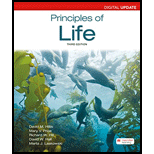
Concept explainers
To determine: The three types of lymphocytes and the three types of phagocytes.
Introduction: The cells that are responsible for adaptive immunity are known as lymphocytes. There are three types of lymphocytes. However, the immune cells that attack the pathogens by the process of phagocytosis are called phagocytes. They engulf the attacking pathogens and kill them.
Explanation of Solution
The three types of lymphocytes are as follows:
- B lymphocytes:
B-cell lymphocytes are the cells that have to differentiate into other types of cells called plasma cells. These plasma cells are able to destroy an antigen. The primary function of the B cells is to produce humoral immune responses, antibodies, and memory cells.
- T lymphocytes:
There are two types of T lymphocytes. These are helper T cells and cytotoxic T cells. The cytotoxic T-cells are the cells that require activation molecules such as an antigen to kill antigens. The function of the cytotoxic T cells is to generate cellular responses. However, helpers T-cells are the cells that enhance the activity of both B and cytotoxic T-cells. The function of the helper T cells is to regulate the humoral and cellular responses.
- Natural Killers (NK):
Natural killers (NK cells) are a type of lymphocytes that kill the pathogens by releasing harmful toxins and chemicals. They attack the body parts that are infected by viruses.
The three types of phagocytes are as follows:
- Macrophages:
These are the phagocyte cells that engulf the invading pathogens and kill them by the process of phagocytosis. They also help in the process of antigen presentation.
- Dendritic cells:
The dendritic cells are the phagocytes that function very similarly to the macrophages. The dendritic cells engulf the pathogens and kill them by the process of phagocytosis. They present the antigens to the T cells.
- Neutrophils:
They are the phagocytes that are involved in the process of inflammation. They destroy the microorganisms that are present in the areas that are affected by inflammation.
Want to see more full solutions like this?
Chapter 36 Solutions
PRINCIPLES OF LIFE:DIGITAL UPDATE
- 22. Which of the following mutant proteins is expected to have a dominant negative effect when over- expressed in normal cells? a. mutant PI3-kinase that lacks the SH2 domain but retains the kinase function b. mutant Grb2 protein that cannot bind to RTK c. mutant RTK that lacks the extracellular domain d. mutant PDK that has the PH domain but lost the kinase function e. all of the abovearrow_forwardWhat is the label ?arrow_forwardCan you described the image? Can you explain the question as well their answer and how to get to an answer to an problem like this?arrow_forward
- Describe the principle of homeostasis.arrow_forwardExplain how the hormones of the glands listed below travel around the body to target organs and tissues : Pituitary gland Hypothalamus Thyroid Parathyroid Adrenal Pineal Pancreas(islets of langerhans) Gonads (testes and ovaries) Placentaarrow_forwardWhat are the functions of the hormones produced in the glands listed below: Pituitary gland Hypothalamus Thyroid Parathyroid Adrenal Pineal Pancreas(islets of langerhans) Gonads (testes and ovaries) Placentaarrow_forward
 Human Anatomy & Physiology (11th Edition)BiologyISBN:9780134580999Author:Elaine N. Marieb, Katja N. HoehnPublisher:PEARSON
Human Anatomy & Physiology (11th Edition)BiologyISBN:9780134580999Author:Elaine N. Marieb, Katja N. HoehnPublisher:PEARSON Biology 2eBiologyISBN:9781947172517Author:Matthew Douglas, Jung Choi, Mary Ann ClarkPublisher:OpenStax
Biology 2eBiologyISBN:9781947172517Author:Matthew Douglas, Jung Choi, Mary Ann ClarkPublisher:OpenStax Anatomy & PhysiologyBiologyISBN:9781259398629Author:McKinley, Michael P., O'loughlin, Valerie Dean, Bidle, Theresa StouterPublisher:Mcgraw Hill Education,
Anatomy & PhysiologyBiologyISBN:9781259398629Author:McKinley, Michael P., O'loughlin, Valerie Dean, Bidle, Theresa StouterPublisher:Mcgraw Hill Education, Molecular Biology of the Cell (Sixth Edition)BiologyISBN:9780815344322Author:Bruce Alberts, Alexander D. Johnson, Julian Lewis, David Morgan, Martin Raff, Keith Roberts, Peter WalterPublisher:W. W. Norton & Company
Molecular Biology of the Cell (Sixth Edition)BiologyISBN:9780815344322Author:Bruce Alberts, Alexander D. Johnson, Julian Lewis, David Morgan, Martin Raff, Keith Roberts, Peter WalterPublisher:W. W. Norton & Company Laboratory Manual For Human Anatomy & PhysiologyBiologyISBN:9781260159363Author:Martin, Terry R., Prentice-craver, CynthiaPublisher:McGraw-Hill Publishing Co.
Laboratory Manual For Human Anatomy & PhysiologyBiologyISBN:9781260159363Author:Martin, Terry R., Prentice-craver, CynthiaPublisher:McGraw-Hill Publishing Co. Inquiry Into Life (16th Edition)BiologyISBN:9781260231700Author:Sylvia S. Mader, Michael WindelspechtPublisher:McGraw Hill Education
Inquiry Into Life (16th Edition)BiologyISBN:9781260231700Author:Sylvia S. Mader, Michael WindelspechtPublisher:McGraw Hill Education





